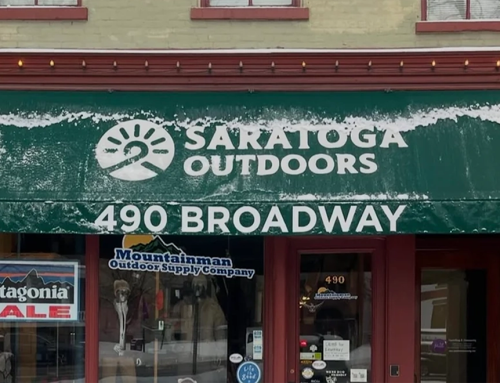Progress was made by the State Legislature on bills that will help protect land, water and wildlife in the Adirondacks, but several bills were left on the shelf.
Three bills important not only for the Adirondacks, but across the state, were passed by both houses of the New York State Legislature, the State Senate and the State Assembly. First, the New York Wildlife Crossings Act (S.4198A-Comrie/A.4243A-Carroll) directs the Department of Transportation and the Thruway Authority to identify sites along roadways in the state where wildlife crossings are most needed to increase public safety and improve habitat connectivity. This legislation has broad, bipartisan support across the State. Assemblymembers, Billy Jones (D), Franklin County, and Matt Simpson (R), Warren County, voted for this bill. Senator Dan Stec (R), Warren County, who represents much of the Adirondack Park, was one of just four Senators who voted against the bill. Protect the Adirondacks cheered the passage of this bill.
The septic information bill (S.8506A-Harckham)/A.9330A-Burdick) passed both houses. It requires sellers of property served by septic systems to provide the buyer with a copy of the New York Department of Health (DOH) pamphlet that educates owners about septic system maintenance. That pamphlet is already required by law for sales involving the construction of new homes served by septic systems. The bill also updates the Property Condition Disclosure Sheet to include information about how to obtain the DOH pamphlet online. This bill is an initial, commonsense approach to raise awareness and educate homeowners about maintaining their septic systems to protect public health and the environment.
The Climate Change Superfund Act (S.2129B-Krueger/A.3351B-Dinowitz) also passed both houses. The purpose of this bill is to establish a climate change adaptation cost recovery program requiring companies that contributed significant greenhouse gas emissions to bear a share of the costs of infrastructure investments required to adapt to climate change.
For all of the bills that were passed by both houses of the Legislature, the focus now switches to Governor Hochul to urge her to sign these Acts into law.
The Senate also passed the NY Home Energy Affordable Transition (NY HEAT) Act (S.2016B-Krueger/A.4592B-Fahy), but it did not pass the Assembly. A bill requiring the electrification of certain watercraft, aircraft and trains (S.2966A-Kavanagh/A.2246B-Simon) did not pass either house.
The title insurance bill (S.6606A-May/A.7372A-Thiele) authorizes the Attorney General’s Office to accept title insurance from a title insurance company that has already researched the property’s chain of title. Having this authority will accelerate the state’s process for conserving land, which is critical to meeting the State’s conservation goals as set forth in the 30 by 30 law passed in 2022, as well as to meet the State’s goals in the Climate Action Plan and to expend funds approved by the People in the Environmental Bond Act for land conservation. The bill passed the Senate, but the Assembly failed to pass it.
The packaging reduction and recycling infrastructure act (S.4246D-Harckham/A.5322D-Glick) would have required product manufacturers to reduce single-use packaging by 30% over 12 years, among other things. This bill also passed the Senate but not the Assembly. The bigger, better bottle bill did not move in either house. That bill (S.237-C-May/A.6353-A-Glick) would update the State’s bottle redemption law by increasing the handling fee for bottles, increase the deposit from a nickel to a dime, and expand the scope of beverage containers covered by the bill to include noncarbonated soft drinks, certain fruit or vegetable juices, coffee, tea, and certain carbonated fruit beverages and cider.
Unfortunately, the New York Wolf Protection bill (S.7927A-Hoylman-Sigal/A.08295A-Carroll) to protect wolves in New York State did not pass either house. The bill would have required the Department of Environmental Conservation to collect genetic data about large canids (e.g., coyotes and wolves) and impose a temporary moratorium on the killing of wild canids if DNA analysis shows evidence of a wolf in a specific geographic area. Although the bill did not pass, DEC has updated its website with more information on wolves, it is working on new hunting curriculum to educate hunters about wolves, and it is seeking DNA analysis on a handful of canids killed in New York.
Finally, efforts to pass a Constitutional amendment to remove three closed correctional facilities from the Forest Preserve (Camp Gabriels in Franklin County, Moriah Shock in Essex County, Mt. McGregor in Saratoga County) did not move. These closed prisons include scores of buildings and occupy 238 acres. They are degraded and fully developed. They have no wilderness value to protect, and in fact they detract from the Forest Preserve values of wilderness, outdoor recreation, solitude and wildness. If they are no longer subject to the legal protections in the Constitution that apply to the Forest Preserve, then they could be redeveloped for an adaptive reuse that would benefit the communities of the Adirondack Park. To the disappointment of many, including Protect the Adirondacks, the Legislature and the Executive could not come to an agreement on the language for a new Constitutional amendment. The amendment can be brought forward again next year, but the earliest that the People of the State of New York can vote to approve it would be the fall of 2027.
Protect the Adirondacks supported a 3 Prisons amendment. Click here to read an article in the Adirondack Almanack. Click here to read a guest op-ed in the Adirondack Daily Enterprise.
Adirondack Park Agency Board Appointments Stalled Again
On appointments to state agencies, four appointments were made to the Lake George Park Commission and no appointments were made to the Adirondack Park Agency (APA). This is the second year in a row where zero appointments were made to the APA Board, which right now among its eight appointed members has one vacancy and six expired terms. The APA Board is at its weakest point in its history.









